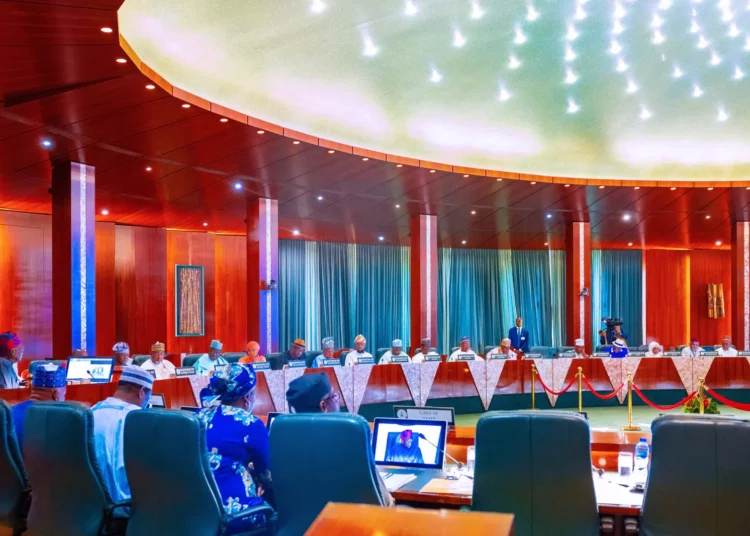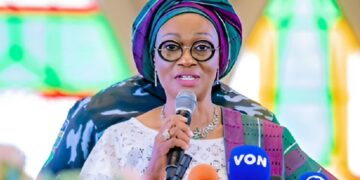There is something refreshing about last week’s National Economic Council meeting. For once, the conversation wasn’t only about the deficits of yesterday or the usual lamentations about dwindling oil revenues. It was about the future — about building a $1 trillion economy by 2030. It was about planning, not reacting.
It was about what happens when a country decides that vision cannot remain an abstract noun in glossy documents, but must become a verb — something done in real time, by real people, in real wards across Nigeria.
Vice President Kashim Shettima, chairing the meeting, made this clear when he described the Renewed Hope Plan (2026–2030) as the “bridge between lessons learnt and ambitions pursued.” It will succeed the current National Development Plan (2021–2025), and if all goes well, form part of the ladder toward Nigeria Agenda 2050 — that 30-year prospective blueprint that sometimes feels like a distant cousin in a family meeting nobody wants to talk to.
The symbolism is important. We are finally talking continuity. We are finally acknowledging that national planning should not expire at the end of each administration like a carton of yoghurt. And perhaps, just perhaps, we are beginning to see that building a $1 trillion economy is not the exclusive job of Abuja technocrats but of ward-level actors — farmers, traders, teachers, artisans — the people who must feel “Renewed Hope” not as a slogan but as bread on their table.
Skeptics will argue, and rightly so, that we have been here before. Nigeria is a country where economic targets are declared with the same ease as campaign promises. Growth projections are tossed around like confetti: 7% here, double-digit there, a trillion-dollar economy by 2030.
But the real question is not whether the numbers can be achieved; it is whether the policies backing them will survive the usual Nigerian disease: half-hearted implementation. For decades, our problem has not been the absence of plans — we have had SAP, NEEDS, Vision 2010, Vision 2020, Agenda 2050. Our problem has been the absence of discipline to follow through.
That is why Shettima’s insistence on inclusivity matters. He promised that the Renewed Hope Plan will not be “drawn from the ivory towers of Abuja” but will involve state and local governments, the private sector, youth, labour, and traditional institutions. If that promise is kept, then this plan may outlive the dustbins that swallowed its predecessors.
Interestingly, amid the trillion-dollar talk, NEC also turned its attention to something as deceptively small as polio immunisation. On the surface, it seemed like a curious detour: how do vaccines for children connect with trillion-dollar economies? The answer is simple — because growth is meaningless if disease cripples the very people meant to power it.
Council ordered the Accountant General of the Federation to release funds quickly for the next round of polio campaigns. Epidemiological data showed a 46% decline in new cases this year, with Kano and Katsina recording over 80% reductions. Yet Sokoto still accounted for 13 of 23 new cases. The fight is not over.
This duality — trillion-dollar ambitions on one hand, basic vaccines on the other — is the paradox of Nigeria. We dream big but often stumble on the small things. A successful development plan must close this gap: make sure the child in Sokoto gets a polio shot while the investor in Lagos gets electricity for his factory. Both are equally important to the economy we want.
Shettima also revealed that NASENI has scaled up the local production of solar-powered irrigation pumps, a step aimed at lowering farmers’ energy costs and expanding dry-season farming. On paper, it is brilliant — weaning agriculture off petrol dependency, boosting food security, and aligning with climate-smart solutions.
But again, the question remains: how many farmers in Zamfara or Benue will actually receive these pumps? How many will have access to credit to buy them? How many will be trained to use them effectively? Too often, interventions remain stuck at the level of glossy launch ceremonies in Abuja but fail to reach the soil where cassava is actually planted. If this plan is to succeed, implementation must flow like water through an irrigation pump — reaching the roots, not just the surface.
One striking thing about NEC’s resolution is the creation of governance structures — a National Steering Committee, a Central Working Group, Technical Groups, co-chaired by public and private actors. This looks good, sounds good, and will make excellent PowerPoint slides. But Nigerians have seen committees rise and fall without leaving footprints in the sand.
If these committees are to matter, they must resist the temptation of elitist capture. They must not become clubs for consultants and retired bureaucrats. They must involve people who know the real Nigeria — governors like Charles Soludo who once wrestled with inflation as a CBN governor, local government chairmen who understand the price of maize in rural markets, even community leaders who know which borehole is broken. Development cannot be managed from air-conditioned rooms alone.
Perhaps the most hopeful sign is the timing. The current plan expires in December, but NEC has already commenced work on the successor plan. For once, there may be no vacuum. For once, the next budget may be drawn from an actual development plan instead of hurried negotiations. This is the continuity Nigeria desperately needs.
It also matters that the Vice President himself framed NEC not as a “stage for applause” but as a “workshop for solutions.” If those words are matched with discipline, then this Council could indeed become the cockpit of Nigeria’s economic rebirth.
At the close of the meeting, Shettima spoke of a covenant: “Let this 151st meeting echo as a continuation of our covenant.” Lofty words. But covenants are not kept in council chambers; they are kept in classrooms where children learn, in hospitals where mothers deliver safely, in farms where farmers harvest, and in factories where workers are paid on time.
The Renewed Hope Plan may well be the most ambitious attempt yet to translate reform into real prosperity. But ambition must be backed by action, and action must be judged not in billions or trillions but in the everyday victories of ordinary Nigerians.
Because in the end, a $1 trillion economy is not about numbers on a chart. It is about whether the tomato seller in Kano earns enough to send her daughter to school. It is about whether a father in Yenagoa can buy malaria drugs without selling his radio. It is about whether a young graduate in Enugu can find work without bribing an uncle.
If NEC keeps sight of these simple truths, then the Renewed Hope Plan will not just be another plan. It will be the plan that finally turned Nigeria’s dreams into Nigeria’s reality.






